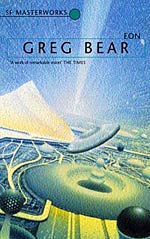
![]() charlesdee
charlesdee
3/8/2013
![]()
This is hard SF on a grand scale. Bear published it in 1984, so he was probably writing it in 1982. Therefore, as often happens, its future 2005 is already our past and so of course we know better about a lot of things. Like the breakup of the Soviet Union. China's ascendence on the world stage. The cold war did not result in a nuclear holocaust that wipes out most life on earth.
The appearance of a large asteroid in near earth orbit prompts the crisis in Eon. The U.S.A. and NATO get there first, leaving Soviets fuming and suspicious. What "our" troops and scientists discover is that the asteroid is from earth's future, or possibly from an alternate timeline. It's hollowed out core shows successive levels of habitation, all now deserted since the inhabitants evacuated down a singularity they opened in the asteroid's northern cap. Deserted libraries contain detailed information of the Big Death, a nuclear war that is scheduled to engulf the earth in a matter of weeks. Spaceships filled with Soviet military are on their way, beings from deep in the singularity are back in the city to monitor the situation, and U.S. and NATO scientists much smarter than myself are busy working out the mysteries of what they call The Stone.
I have a confession to make. When I read hard SF, I make the same sort of compromise with the science involved that I make with character names in Russian novels. I let the impenetrable science, like the unpronounceable names, slide by, assuming I am picking up the gist of the thing and trying not to impede the narrative flow. So I really have no idea how much Bear extrapolates from the most advanced thinking of his day and what is more fanciful speculation on his part.
There are probably too many ideas in this book just as there are too many characters, although I would never wish it to be longer. Bear turns in restrained descriptions of the visual marvels and handles the action sequences well. The political maneuvering is believable if at times dated, and it is not limited to the 21st century humans. Our descendants, 1300 years in the future, still have their factions and their enemies at the gate.
This is a book about possibilities and the human blunders that can shut those possibilities down, for instance by burying them in a nuclear winter. Bear doesn't lay on the grandeur too thick, but through the central character of Patricia Luisa Vasquez, he conveys the sense of awe and terrible responsibility that those who can not only visualize but actually realize those possibilities must feel.
And suddenly, without any reason, without any certainty of her success, she felt wonderful. Patricia Luisa Vasquez existed in a bubble of joy, independent of all that had gone before, not caring what would come after...It had neither confidence nor euphoria in its character; it was simply a fulfillment of all that she had experienced, and would experience...The universe had twisted in some incomprehensible way and delivered to her an experience drawn from the visions in her head...
http://www.potatoweather.blogspot.com